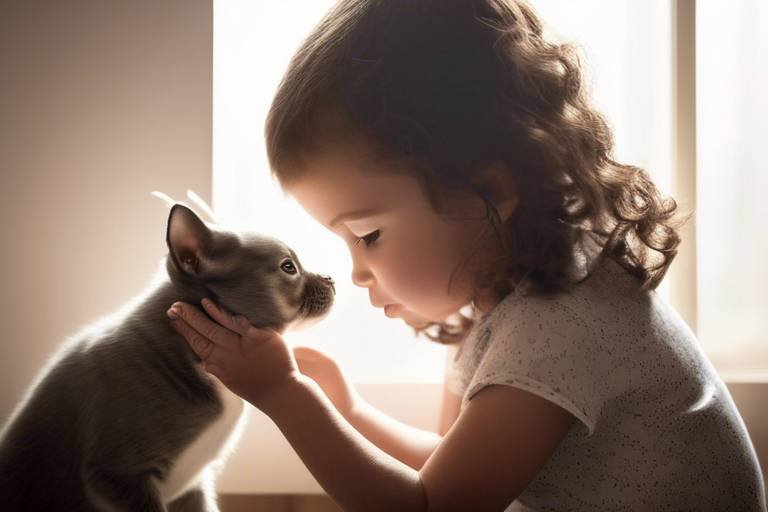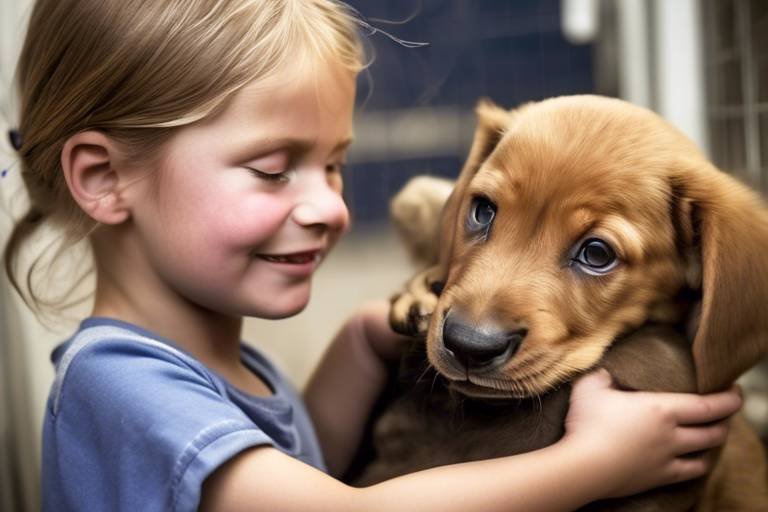How to Address Common Concerns About Pet Adoption
Adopting a pet can be one of the most rewarding experiences of your life, but it also comes with its fair share of concerns. Many potential adopters find themselves grappling with questions about commitment, financial responsibilities, and the overall compatibility of a new furry friend with their lifestyle. This article dives deep into these prevalent concerns, offering insights and practical solutions to help you make informed decisions. By addressing these worries, we aim to illuminate the path to welcoming a pet into your home, transforming your life in ways you never thought possible.
First and foremost, it’s essential to recognize that adopting a pet is not just a fleeting decision; it’s a long-term commitment that can last for years. Think of it as entering a relationship where you are responsible for another living being. Much like a partner or a child, pets require love, attention, and care. They thrive on companionship and routine, and they depend on you for their well-being. Understanding the depth of this commitment is crucial before you take the leap into pet parenthood.
So, what does this commitment entail? It goes beyond just feeding and walking your pet. You’ll need to consider regular veterinary check-ups, vaccinations, grooming, and training. Each of these aspects requires time, effort, and, yes, money. It’s like planning a family vacation; you wouldn’t set off without knowing where you’re going and how much it will cost, right? Similarly, you should prepare yourself for the journey of pet ownership with a clear understanding of the responsibilities involved.
Now, let’s talk about the exciting part: choosing the right pet! Not every pet is suited for every person. This is where the magic of compatibility comes into play. Factors such as breed, size, and temperament should be at the forefront of your decision-making process. For instance, if you live in a small apartment, a Great Dane might not be the best choice, whereas a small dog or even a cat could fit perfectly into your cozy space.
In addition to physical compatibility, you’ll also want to assess your lifestyle. Are you a busy professional who travels often, or do you work from home? Your daily routine can significantly influence the type of pet that would thrive in your environment. Take a moment to reflect on your life:
- How much time can you dedicate to a pet each day?
- Do you have children or other pets at home?
- Is your living space conducive to the pet you’re considering?
By answering these questions, you can start to narrow down your options and find a pet that aligns with your lifestyle. Remember, adopting a pet is not just about saving a life; it’s about enriching your own life with a loving companion.
Next, let’s consider the financial implications of pet ownership. Many people underestimate the costs associated with having a pet, which can lead to stress and hardship down the line. It’s essential to be fully aware of both the initial adoption fees and the ongoing expenses. Adoption fees can vary widely, often covering vaccinations, spaying/neutering, and sometimes even initial supplies. Understanding what these fees cover can help you appreciate the value of adopting from a shelter.
Once you’ve adopted your new friend, the costs don’t stop there. You’ll need to budget for:
- Food and treats
- Regular veterinary visits
- Grooming supplies
- Training classes
- Emergency medical expenses
Having a clear financial plan can alleviate a lot of stress and help you focus on the joy of having a pet. It’s like preparing for a new job; the more you know what to expect, the better equipped you’ll be to handle the challenges that come your way.
To wrap things up, let’s address some common questions that potential adopters often have:
- How do I know if I’m ready to adopt a pet? Consider your lifestyle, time availability, and financial readiness.
- What if I find that my adopted pet doesn’t fit my lifestyle? Many shelters have return policies, but it’s vital to do your research and choose wisely.
- Are there resources available to help with pet care costs? Yes! Look for local assistance programs or pet care insurance options.
In conclusion, addressing these common concerns about pet adoption can pave the way for a fulfilling and joyful experience. By understanding the commitment, choosing the right pet, and preparing for financial responsibilities, you’ll be well on your way to enjoying the unconditional love and companionship that a pet can bring into your life.

Understanding the Commitment
This article explores the prevalent concerns surrounding pet adoption, providing insights and solutions to help potential adopters make informed decisions and embrace the joys of welcoming a pet into their home.
Adopting a pet is not just a fleeting decision; it’s a long-term commitment that can last for years, sometimes even decades. When you bring a furry friend into your life, you’re not just gaining a companion; you’re also taking on the responsibility of caring for a living being. This means providing them with food, shelter, medical care, and, most importantly, love and attention. Think of it like entering into a relationship—one that requires effort, patience, and dedication.
Before deciding to adopt, ask yourself if you’re truly ready for this journey. Are you prepared to handle the ups and downs that come with pet ownership? From the joy of puppy cuddles to the challenges of vet visits, every moment counts. It’s essential to consider your current lifestyle and future plans. Will you be moving? Starting a family? These factors can impact your ability to care for a pet.
Moreover, it's important to understand that pets can live for many years. For example, dogs can live anywhere from 10 to 15 years, while some cats can live into their twenties. This longevity means you need to plan not just for the present but for the future as well. Are you ready to commit to this animal for its entire life? If so, then you’re on the right path!
Let’s break down some of the core responsibilities involved in pet ownership:
- Daily Care: This includes feeding, walking, grooming, and playing with your pet. Each of these activities requires time and attention.
- Health Care: Regular veterinary check-ups, vaccinations, and emergency care can add up. You need to be financially prepared for these expenses.
- Training: Many pets require training to adapt to their new homes. This can be time-consuming but is essential for a well-behaved companion.
- Socialization: Pets need social interaction, not just with humans but also with other animals. This is crucial for their mental well-being.
In essence, adopting a pet is like embarking on a new adventure. It's filled with excitement and challenges, but the love and companionship you'll receive in return are immeasurable. So, before you rush into adoption, take a moment to reflect on your readiness to commit to this beautiful journey of pet ownership.
Selecting the right pet for your lifestyle is crucial. Here, we explore factors to consider, such as breed, size, and temperament, to ensure a harmonious match between you and your new companion.
Your daily routine and living situation play a significant role in determining the right pet for you. This subsection provides tips on evaluating your lifestyle to make an informed choice.
Different pets require varying levels of time and attention. Understanding these needs can help you choose a pet that fits seamlessly into your life and schedule.
Each pet has unique space needs. This part highlights how to assess your living space to ensure it accommodates the pet you wish to adopt.
Understanding different breeds and their temperaments is essential for a successful adoption. This section emphasizes the importance of research to find a pet that matches your personality and lifestyle.
Adopting a pet involves financial responsibilities. This section outlines the costs associated with pet care, including food, veterinary visits, and supplies, helping potential adopters prepare financially.
Adoption fees can vary significantly. Here, we discuss what these fees typically cover and how they contribute to the care of the animals in shelters.
Beyond initial fees, pet ownership entails ongoing costs. This subsection breaks down the regular expenses to expect, ensuring adopters are financially prepared for their new responsibilities.
As we wrap up this discussion on pet adoption, let’s address some common questions that potential adopters often have:
- What should I do if I feel overwhelmed after adopting a pet? It's normal to feel overwhelmed. Reach out to local pet communities or trainers for support.
- Can I adopt a pet if I have allergies? Yes! Consider hypoallergenic breeds and consult with your doctor.
- What if I need to move or change my living situation? Always have a plan in place for your pet’s care during transitions.

Choosing the Right Pet
When it comes to bringing a furry friend into your home, choosing the right pet is like picking the perfect partner. You want someone who complements your lifestyle, shares your energy levels, and fits seamlessly into your daily routine. This decision can be overwhelming, but don’t worry! By considering a few key factors, you can ensure that your new companion will bring joy and fulfillment to your life.
First and foremost, think about your lifestyle. Are you a busy professional who spends long hours at work, or do you have a flexible schedule that allows for more time at home? Different pets have varying needs for companionship and activity. For example, a high-energy dog might not be the best fit for someone who is rarely home, while a cat could be a more suitable option. By evaluating your daily routine, you can make an informed choice that aligns with your availability.
Next, consider the space you have available. The size of your living environment matters greatly when choosing a pet. If you live in a small apartment, a large breed dog might feel cramped and unhappy. On the other hand, smaller breeds or even pets like hamsters or guinea pigs could thrive in a cozy space. Take a good look at your home and think about how much room you can provide for a new pet. It’s important to ensure they have enough space to roam and play comfortably.
Another vital aspect to ponder is the temperament of the pet you’re considering. Each breed has its own unique personality traits. Some dogs are naturally more playful and energetic, while others are calm and laid-back. Similarly, cats can range from being social and affectionate to independent and aloof. Researching different breeds and understanding their characteristics can help you find a pet that matches your personality and lifestyle. For instance, if you’re someone who enjoys outdoor activities, a dog that loves to hike and run might be your ideal match.
To make your search easier, here’s a quick overview of some common pet types and their general characteristics:
| Pet Type | Energy Level | Space Needs | Typical Temperament |
|---|---|---|---|
| Dogs | Varies by breed | Medium to large | Playful, loyal, social |
| Cats | Low to moderate | Small to medium | Independent, affectionate |
| Rabbits | Low | Small | Gentle, social |
| Hamsters | Low | Very small | Curious, nocturnal |
Lastly, don’t forget to consider any allergies or special needs within your household. If someone in your family has allergies, it might be wise to look into hypoallergenic breeds or smaller pets that produce less dander. Ensuring that everyone in your home is comfortable and happy is crucial when welcoming a new pet.
In conclusion, choosing the right pet is a multifaceted decision that requires deep reflection on your lifestyle, living space, and family dynamics. By taking the time to assess these factors, you can find a furry companion that not only fits into your life but enhances it in ways you never imagined. So, take a deep breath, do your research, and get ready to welcome a new friend into your home!
Assessing Your Lifestyle
When it comes to adopting a pet, one of the most critical steps is . This isn’t just about choosing a cute face; it’s about finding a furry friend that fits seamlessly into your daily routine. Think of it like picking a dance partner—if you’re a slow waltzer and your partner is a wild tango dancer, you’re bound to step on each other's toes! So, how do you figure out what kind of pet will groove with your life?
First, take a moment to reflect on your daily schedule. Are you a busy bee buzzing around with work, social commitments, and hobbies? Or do you enjoy a more laid-back lifestyle with plenty of time to spare? The amount of time you can dedicate to a pet will greatly influence your choice. For example, dogs often require more attention, exercise, and social interaction compared to cats, who are generally more independent. If you’re out of the house for long hours, a cat or a small pet like a hamster might be more suitable.
Next, consider your living situation. Do you live in a cozy apartment, a house with a yard, or maybe a shared space? Your home’s size and layout will determine which pets can thrive in your environment. Large breeds, for instance, may feel cramped in a small apartment, while a tiny dog could be perfectly content in a limited space. It’s essential to think about the space requirements of different pets. Here’s a quick breakdown:
| Pet Type | Space Needed | Best Living Situation |
|---|---|---|
| Dogs | Medium to large space | House with a yard or active family |
| Cats | Small to medium space | Apartment or house |
| Small Pets (Hamsters, Guinea Pigs) | Very small space | Any living situation |
| Fish | Minimal space | Any living situation |
Moreover, let’s not forget about your energy levels! If you’re someone who enjoys outdoor activities like hiking or running, a high-energy dog could be your perfect companion. On the other hand, if you prefer lounging on the couch with a good book, a more low-key pet would be a better fit. Understanding your energy levels can help you choose a pet that matches your vibe.
Finally, take into account any allergies or special needs within your household. If someone in your family is allergic to fur, you might want to consider hypoallergenic breeds or even non-furry pets. By assessing all these factors, you can make a well-informed decision that not only benefits you but also ensures a happy and healthy home for your future pet.
In conclusion, assessing your lifestyle is a fundamental step in the pet adoption journey. By honestly evaluating your time, space, energy, and any special considerations, you’ll be on your way to finding a furry companion that complements your life perfectly. Remember, adopting a pet is not just about the pet; it’s about creating a loving, lasting relationship that enriches both your lives.
- What should I consider before adopting a pet? Consider your daily routine, living situation, energy levels, and any allergies in your household.
- How do I know if I have enough time for a pet? Evaluate your current commitments and how much time you can realistically dedicate to a pet each day.
- Are there pets that require less space? Yes, small pets like hamsters or fish can thrive in smaller living spaces.
- What if I have allergies? Consider hypoallergenic breeds or non-furry pets to accommodate allergies.
Time and Attention
When it comes to welcoming a furry friend into your home, understanding the required is essential. Think of adopting a pet like starting a new job; it demands commitment, dedication, and a fair amount of your time. Each pet has its unique personality and needs, which means that some may thrive on constant companionship while others may be more independent. For instance, dogs typically require daily walks, playtime, and social interaction, whereas cats might be perfectly content lounging by the window for hours on end.
To help you gauge how much time you can realistically dedicate to a pet, consider the following:
- Your Work Schedule: Do you work long hours? If so, a more independent pet, like a cat or a small animal, might be a better fit.
- Family Dynamics: If you have children, they can be a great source of companionship for a pet, but make sure everyone is on board with the responsibility.
- Social Life: Will your weekends be filled with outings? If you're often away from home, think about how that will affect your pet's well-being.
Moreover, pets are not just a hobby; they’re a part of your family. Just like a child, they need love, attention, and training. A well-cared-for pet is a happy pet, and a happy pet means a happy owner! If you find yourself overwhelmed with your current commitments, it might be wise to reconsider the timing of your adoption. Remember, it’s not just about having a pet; it’s about being the best pet parent you can be.
In the grand scheme of things, investing time in your pet leads to a stronger bond and a more fulfilling relationship. Imagine coming home after a long day to a wagging tail or a gentle purr. Those moments make all the hours spent training, playing, and caring for your pet worth it. So, take a moment to reflect: Are you ready to embrace the joys and responsibilities of pet ownership?
Space Requirements
When it comes to adopting a pet, one of the most critical factors to consider is the of your potential new companion. Each type of pet has its own unique needs, and understanding these can significantly impact both your and your pet's quality of life. For instance, while a small dog breed might thrive in a cozy apartment, a larger breed may require a spacious home with a yard to run around. It's essential to think about not just the size of your living space, but also the layout and environment.
Before making a decision, take a moment to evaluate your home. Ask yourself questions like: Do I have enough room for a pet to move around comfortably? Is there a safe outdoor area for my pet to explore? If you live in an apartment, consider how often you can take your pet outside for exercise. For larger animals, such as dogs, regular outdoor activity is crucial for their physical and mental well-being.
Here’s a quick comparison of space requirements based on different types of pets:
| Pet Type | Minimum Space Requirement | Ideal Space |
|---|---|---|
| Small Dogs | Apartment (500 sq ft) | Small yard or nearby park |
| Large Dogs | House with a yard (1000 sq ft) | Access to a large park or open space |
| Cats | Apartment (500 sq ft) | Multi-room home with climbing spaces |
| Small Animals (e.g., hamsters, rabbits) | Small cage (minimum 24x12 inches) | Play area with safe boundaries |
Additionally, consider the environment in which your pet will live. Pets need a safe and secure space where they can feel at home. Ensure that your living area is free from hazards, such as toxic plants or small objects that could be swallowed. Providing a comfortable resting area, toys, and room to explore can make a world of difference in your pet's happiness.
Ultimately, adopting a pet is not just about filling a void in your life; it’s about creating a nurturing environment where both you and your pet can thrive together. By carefully assessing your space and understanding the needs of your new companion, you can ensure a smoother transition into pet ownership.
- What is the best type of pet for a small living space? Small dog breeds, cats, and small animals like hamsters or rabbits are typically suitable for smaller living areas.
- How can I make my home pet-friendly? Remove hazards, provide safe spaces for your pet to play, and ensure they have a comfortable resting area.
- Do pets need outdoor space? Yes, many pets, especially dogs, require outdoor access for exercise and mental stimulation.
Researching Breeds and Temperaments
This article explores the prevalent concerns surrounding pet adoption, providing insights and solutions to help potential adopters make informed decisions and embrace the joys of welcoming a pet into their home.
Adopting a pet is a long-term commitment that requires careful consideration. This section discusses the responsibilities involved in pet ownership and the importance of being prepared for the journey ahead.
Selecting the right pet for your lifestyle is crucial. Here, we explore factors to consider, such as breed, size, and temperament, to ensure a harmonious match between you and your new companion.
Your daily routine and living situation play a significant role in determining the right pet for you. This subsection provides tips on evaluating your lifestyle to make an informed choice.
Different pets require varying levels of time and attention. Understanding these needs can help you choose a pet that fits seamlessly into your life and schedule.
Each pet has unique space needs. This part highlights how to assess your living space to ensure it accommodates the pet you wish to adopt.
When it comes to pet adoption, researching breeds and their temperaments is absolutely vital. Just like people, pets come with their own unique personalities and quirks, which can significantly affect how well they fit into your life. Imagine bringing home a hyperactive puppy when you’re a couch potato; it’s like trying to mix oil and water! To avoid such mismatches, take the time to delve into the characteristics of various breeds.
Start by identifying what traits are most important to you. Do you want a playful companion that can keep up with your active lifestyle, or are you looking for a laid-back buddy to snuggle with on lazy weekends? Each breed has its own set of tendencies that can either complement or clash with your lifestyle. For instance, herding breeds like Border Collies are known for their high energy and intelligence, making them great for active families but potentially overwhelming for someone who prefers a quieter life.
Additionally, consider the temperament of the breed. Some dogs are naturally more sociable and friendly, while others may be reserved or even aloof. Cats, too, have their own personalities; some are affectionate lap cats, while others are independent explorers. To give you a clearer picture, here’s a brief overview of a few popular breeds and their general temperaments:
| Breed | Temperament | Energy Level |
|---|---|---|
| Labrador Retriever | Friendly, outgoing | High |
| Bulldog | Calm, courageous | Low |
| Beagle | Curious, friendly | Medium |
| Siamese Cat | Vocal, social | Medium |
| Maine Coon | Gentle, friendly | Low |
Researching also involves talking to shelters, breeders, and pet owners. They can provide firsthand insights into the breed’s behavior and needs. Online forums and breed-specific groups can also be treasure troves of information. Remember, the goal is to find a pet that not only matches your lifestyle but also brings joy and companionship into your life.
Lastly, don’t forget about the importance of socialization. Regardless of breed, every pet can benefit from proper training and socialization to help them adapt to their new home. This not only helps in building a strong bond between you and your pet but also ensures that they grow into well-behaved companions.
Adopting a pet involves financial responsibilities. This section outlines the costs associated with pet care, including food, veterinary visits, and supplies, helping potential adopters prepare financially.
Adoption fees can vary significantly. Here, we discuss what these fees typically cover and how they contribute to the care of the animals in shelters.
Beyond initial fees, pet ownership entails ongoing costs. This subsection breaks down the regular expenses to expect, ensuring adopters are financially prepared for their new responsibilities.
- What are the first steps I should take when considering pet adoption?
- How can I prepare my home for a new pet?
- What should I do if my pet doesn’t adjust well?
Start by assessing your lifestyle, researching different breeds, and visiting local shelters to meet potential pets.
Ensure your home is safe by removing hazards, setting up a designated space for your pet, and stocking up on necessary supplies.
Patience is key! Consider consulting a veterinarian or a professional trainer for guidance on helping your pet acclimate.

Financial Considerations
Adopting a pet is not just about the joy of companionship; it also comes with a range of financial responsibilities that every potential pet owner must consider. It's vital to understand that the initial excitement of bringing a furry friend home can quickly be overshadowed by unexpected costs. Therefore, being financially prepared is essential for a smooth transition into pet ownership.
First and foremost, let's talk about the initial adoption fees. These fees can vary widely depending on the shelter or rescue organization you choose. Typically, adoption fees range from $50 to $200, but they can be higher for purebred animals or specific breeds. You might wonder, what do these fees cover? Well, they often include essential services such as vaccinations, spaying or neutering, and sometimes even microchipping. By paying these fees, you're not just acquiring a pet; you're also contributing to the ongoing care of animals in shelters, which is an important aspect of responsible pet ownership.
But the costs don’t stop there. After the initial adoption, you’ll face ongoing expenses that can add up over time. Here’s a breakdown of some regular costs you should anticipate:
| Expense Type | Estimated Monthly Cost |
|---|---|
| Food | $30 - $100 |
| Routine Veterinary Care | $20 - $50 |
| Grooming | $20 - $80 |
| Supplies (toys, bedding, etc.) | $10 - $30 |
| Pet Insurance (optional) | $30 - $70 |
As you can see from the table, the costs can vary significantly based on the type of pet you adopt and your specific choices regarding food and care. For instance, larger breeds typically eat more and may require more expensive food, while smaller pets might be less demanding in terms of dietary needs. Additionally, routine veterinary care is crucial for maintaining your pet's health, and it can include vaccinations, check-ups, and emergency care. It's wise to set aside a budget for these expenses to avoid any financial strain.
Moreover, don't forget about unexpected costs. Pets can be unpredictable, and emergencies do happen. Whether it’s a sudden illness or an accident, having an emergency fund dedicated to your pet can save you from making tough decisions later on. A good rule of thumb is to have at least a few hundred dollars set aside for unexpected veterinary expenses.
In conclusion, while adopting a pet can bring immense joy and companionship, it’s crucial to approach it with a clear understanding of the financial commitments involved. By preparing for both the initial and ongoing expenses, you can ensure a happy and healthy life for your new furry friend.
- What are the typical costs associated with adopting a pet? Adoption fees can range from $50 to $200, and ongoing expenses can include food, veterinary care, and supplies.
- Do adoption fees cover all initial expenses? Generally, yes. Adoption fees often cover vaccinations, spaying/neutering, and sometimes microchipping.
- How can I budget for unexpected pet expenses? It’s advisable to set aside an emergency fund specifically for your pet, ideally a few hundred dollars.
Initial Adoption Fees
When considering pet adoption, one of the first things that may come to mind is the initial adoption fee. This fee can vary widely depending on the type of pet, the organization facilitating the adoption, and even the region where you live. Generally, you might expect to pay anywhere from $50 to $300 for a dog or cat. This fee often includes essential services such as vaccinations, spaying or neutering, and sometimes even microchipping.
Now, you might wonder, what exactly does this fee cover? Let's break it down:
| Service | Description |
|---|---|
| Vaccinations | Most shelters ensure that the pet is up-to-date on essential vaccinations to protect their health and yours. |
| Spaying/Neutering | This procedure is crucial for controlling the pet population and is often included in the fee. |
| Microchipping | Microchips help reunite lost pets with their owners, making it a valuable service included in the fee. |
| Initial Health Check | Many shelters conduct a health check before adoption to ensure the pet is fit for a new home. |
It's important to remember that while the initial adoption fee might seem like a significant expense, it often pales in comparison to the long-term costs of pet ownership. Think of it as an investment in your pet's future health and happiness. Plus, adopting from a shelter means you are giving a loving home to a pet in need, which is an incredibly rewarding experience.
In addition to the adoption fee, some organizations may also charge a donation or a membership fee, which goes towards the care of other animals in the shelter. This can be a great way to support the cause and ensure that more pets can find their forever homes.
So, when you're budgeting for adoption, don't just consider the initial fee. Think about the entire picture, including the joy and companionship a pet will bring into your life. After all, that’s what makes it all worthwhile, isn’t it?
- What is included in the adoption fee? - The adoption fee typically covers vaccinations, spaying/neutering, microchipping, and an initial health check.
- Are there any additional costs after adoption? - Yes, ongoing expenses include food, veterinary care, grooming, and supplies like toys and bedding.
- Can I negotiate the adoption fee? - Some shelters may offer discounts or sliding scales based on your financial situation, so it’s worth asking!
Ongoing Expenses
When you decide to welcome a furry friend into your home, it’s important to recognize that the initial adoption fee is just the tip of the iceberg. The reality is that pet ownership comes with a series of ongoing expenses that can significantly impact your budget. These costs can vary widely based on the type of pet you adopt, their specific needs, and your lifestyle choices. Understanding these expenses will not only prepare you financially but also help you provide the best care for your new companion.
First and foremost, you’ll need to consider food costs. Just like humans, pets need a balanced diet to thrive. Depending on the size and dietary requirements of your pet, food costs can range from a few dollars a week for small animals to over a hundred dollars for larger breeds. For example, high-quality dog or cat food can be more expensive but is essential for their health. Additionally, if you have a pet with special dietary needs, such as allergies or medical conditions, the food costs can increase even more.
Next, let’s talk about veterinary care. Regular check-ups, vaccinations, and preventive care are crucial for maintaining your pet's health. Routine vet visits can set you back anywhere from $50 to $200 each time, depending on the services provided. It’s also wise to budget for unexpected medical expenses, as pets can have accidents or develop health issues that require immediate attention. Having a pet insurance plan can help mitigate these costs, but it’s an additional expense to consider.
Beyond food and veterinary care, there are other essential supplies that you'll need to budget for. This includes items like collars, leashes, bedding, toys, grooming supplies, and litter (for cats). These initial purchases can add up quickly, but they are necessary for your pet's comfort and well-being. Here’s a quick breakdown of some common supplies you might need:
| Item | Estimated Cost |
|---|---|
| Collar and Leash | $20 - $50 |
| Bedding | $30 - $100 |
| Toys | $15 - $50 |
| Grooming Supplies | $20 - $100 |
| Litter (for cats) | $10 - $30/month |
Another important aspect to consider is training. Depending on your pet's behavior and your training approach, you might need to invest in classes or private sessions with a trainer. These costs can range from $100 for basic obedience classes to several hundred dollars for specialized training. Remember, investing in training can lead to a more harmonious relationship with your pet and fewer issues down the line.
Lastly, don’t forget about pet sitting or boarding services if you travel frequently. Hiring a pet sitter or using a boarding facility can add to your monthly expenses, especially if you have to do it regularly. Rates vary widely based on location and the services provided, so it’s wise to research and factor this into your budget if you foresee needing these services.
In summary, while adopting a pet is an incredibly rewarding experience, it’s essential to be fully aware of the ongoing expenses that come with it. By budgeting for food, veterinary care, supplies, training, and potential boarding, you can ensure that your new companion receives the love and care they deserve without breaking the bank. Remember, a well-cared-for pet is a happy pet, and that happiness is worth every penny!
Frequently Asked Questions
- What should I consider before adopting a pet?
Before adopting a pet, it's essential to assess your lifestyle, including your daily routine, living situation, and how much time you can dedicate to a new companion. Think about whether you have enough space for the pet, and consider any allergies or other family members' preferences.
- How do I choose the right pet for my lifestyle?
Choosing the right pet involves understanding the different breeds and their temperaments. Research various breeds to find one that matches your personality and lifestyle. Consider factors like energy level, size, and grooming needs to ensure a harmonious relationship.
- What are the financial responsibilities of pet ownership?
Pet ownership comes with both initial and ongoing costs. Initial adoption fees usually cover vaccinations and spaying/neutering, while ongoing expenses include food, veterinary visits, grooming, and supplies. It's crucial to budget for these costs to provide proper care for your pet.
- Are there any hidden costs associated with adopting a pet?
Yes, there can be hidden costs when adopting a pet. Besides the obvious expenses like food and veterinary care, consider costs for training, pet insurance, and emergency medical expenses. It's wise to have a financial cushion for unexpected situations.
- How can I prepare my home for a new pet?
Preparing your home for a new pet involves creating a safe and welcoming environment. Remove any hazardous items, set up a designated space for your pet, and ensure you have all necessary supplies like food, water bowls, and toys ready before bringing your new friend home.
- What if I have allergies but still want to adopt a pet?
If you have allergies, consider hypoallergenic breeds or smaller pets that may produce fewer allergens. Spend time with potential pets before adopting to see how you react, and consult with an allergist for tailored advice on managing allergies with pets.
- Can I adopt a pet if I live in an apartment?
Absolutely! Many pets thrive in apartment living, especially smaller breeds or those with lower energy levels. Just ensure that your apartment has enough space for the pet you choose and that you can provide adequate exercise and stimulation.



















